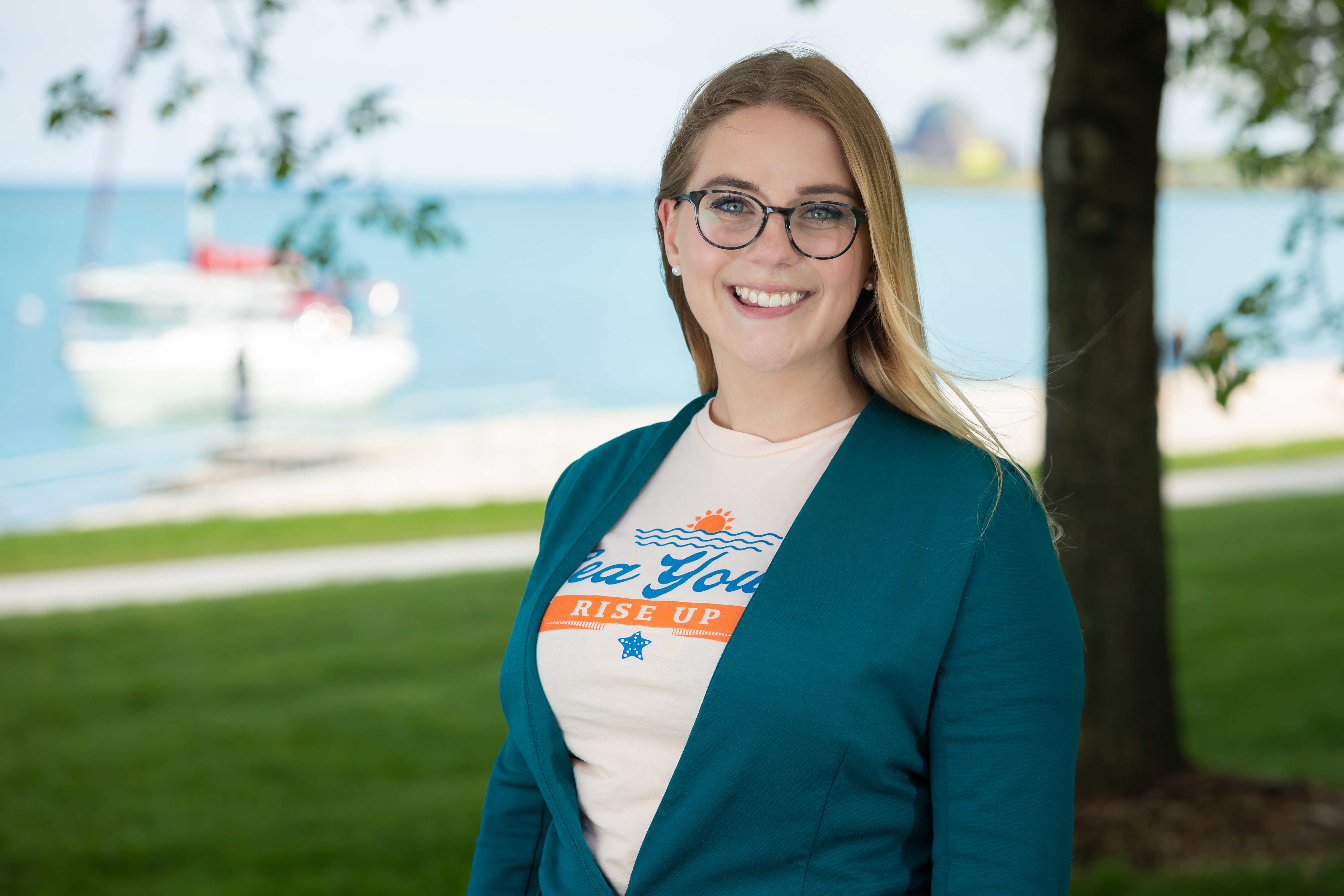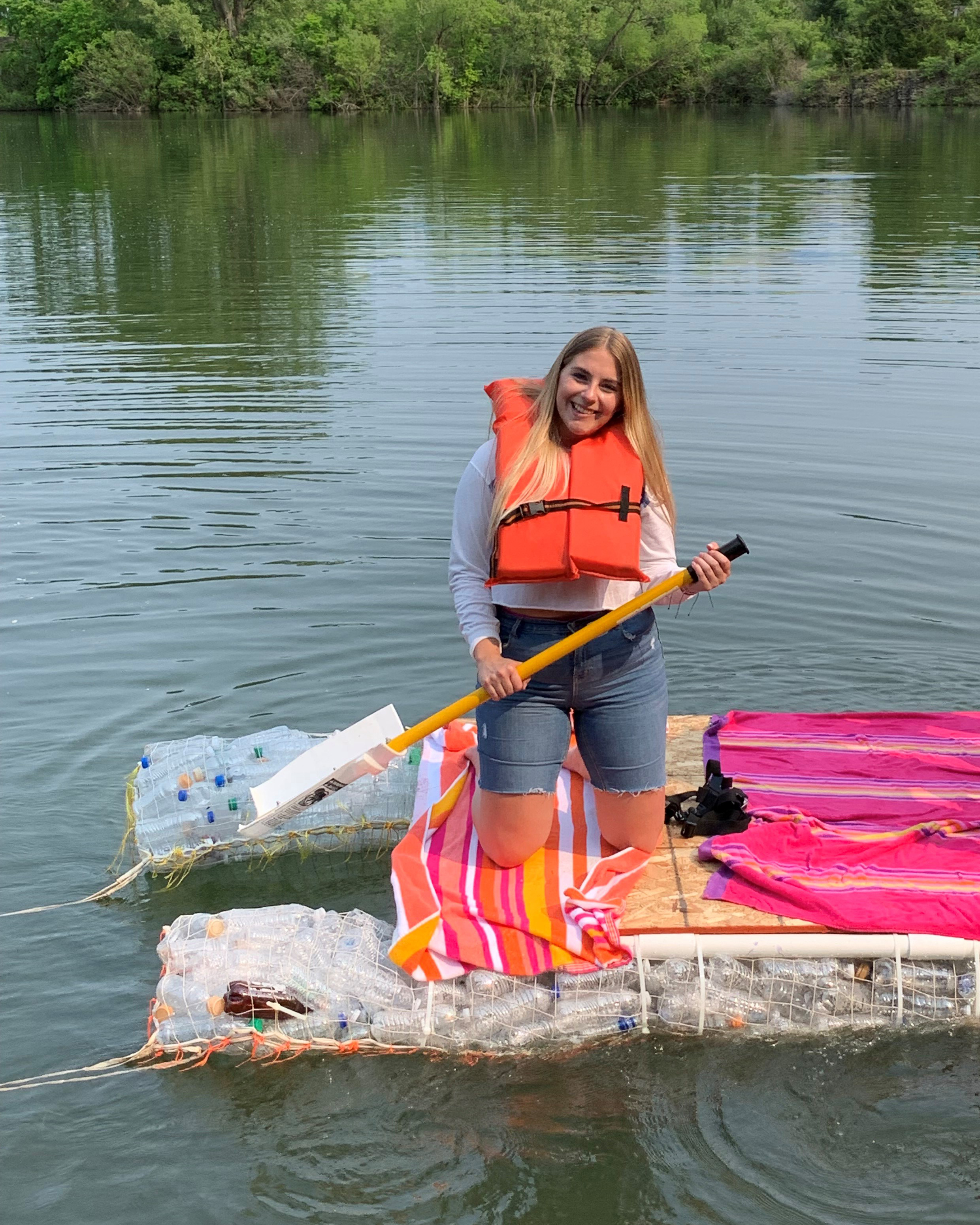 Baylee Ritter, a 2019 DePaul University graduate, is using the PR and environmental communication skills she learned during her college years to educate others on the dangers of plastic in our world's oceans. (DePaul University/Jeff Carrion)
Baylee Ritter, a 2019 DePaul University graduate, is using the PR and environmental communication skills she learned during her college years to educate others on the dangers of plastic in our world's oceans. (DePaul University/Jeff Carrion)CHICAGO — Growing up in a town of 36 people in rural Illinois, Baylee Ritter knew that the world extended far beyond the cornfields of McDowell. Ritter’s love for the environment would soon take her as far away as Africa to discuss a pharmaceutical disposal organization she founded with her father, to the United Nations to speak about the harms of plastic in the ocean, and even on a journey down an Illinois river in a boat made of plastic trash.
"My parents really tried to instill in us the importance of connecting with the greater planet," said Ritter. “They reminded us that while our local community was small, our Earthly neighbors number some 7 billion.”
This June, Ritter will celebrate graduation from DePaul University’s College of Communication, where she finished summa cum laude while earning a Bachelor of Arts degree with a double major in public relations and advertising and communication and media with a minor in environmental communication.
DePaul associate professor Barbara Willard says Ritter is poised to create change through a career in environmental PR and communications.
“The environment needs the best public relations people it can possibly find. It needs clear and understandable messages that can be compelling to people. I think Baylee has those skills and the passion for it,” said Willard.
Speaking up and speaking out
When Ritter was a college junior, she was invited to speak at the U.N. General Assembly about plastic in the ocean as part of the Sea Youth Rise Up delegation. Ritter wrapped up her speech with the quote “an ounce of prevention is truly worth a pound of cure.”
“I guarantee everyone in that room has thought that what they do is not enough,” she said. “However, if we all feel that way, it means there are people doing things that combined are already changing our planet, no matter how big or small their actions are.”
 Baylee Ritter, a 2019 DePaul University graduate, helped make a boat composed of discarded plastic before setting sail down the Vermilion River in Illinois to raise awareness about how inland plastic can eventually make its way to our world's oceans. (Photo courtesy of Baylee Ritter)A few months later, Ritter found herself on a boat made of discarded plastic, which she had made with her father, Paul, and three local high school students. They had collected plastic from neighborhoods and ditches near her hometown and turned the discarded materials into a giant plastic boat. The group sailed almost three miles down the Vermilion River in Illinois to raise awareness for how plastic in local communities can reach the planet’s oceans.
Baylee Ritter, a 2019 DePaul University graduate, helped make a boat composed of discarded plastic before setting sail down the Vermilion River in Illinois to raise awareness about how inland plastic can eventually make its way to our world's oceans. (Photo courtesy of Baylee Ritter)A few months later, Ritter found herself on a boat made of discarded plastic, which she had made with her father, Paul, and three local high school students. They had collected plastic from neighborhoods and ditches near her hometown and turned the discarded materials into a giant plastic boat. The group sailed almost three miles down the Vermilion River in Illinois to raise awareness for how plastic in local communities can reach the planet’s oceans.
“According to a study done in the Environmental Science & Technology Journal, 90% of all ocean plastic comes from 10 inland rivers,” she said. “So what’s really important to me right now is to educate inland communities on ocean plastic and the impact it can have on not only the wildlife that calls the world’s oceans home, but on us as well.
“When we decided to make the boat, my main goal was to be a living infographic and show my community step by step how plastic from communities like ours adds to the global plastic pollution crisis,” she added.
An environmentalist at an early age
Ritter’s father is a high school environmental science teacher and has been a strong influence on his daughter’s love and respect for the environment. Exploratory trips around the family’s backyard when Ritter was a child often came with a learning opportunity.
“I used to dream about the species of the Amazon and wanted to explore the Barrier Reef, but my dad proved that your own backyard can be an equally exciting ecosystem to explore,” said Ritter.
Together with her father, a 10-year-old Ritter developed the nonprofit “Pill and Drug Disposal Program (P2D2),” which aims to keep expired or unwanted medications from polluting the Earth’s soil and water by providing medicine disposal boxes at local police stations and pharmacies.
A few years after the company’s founding, a high school-aged Ritter, began traveling across the U.S. and around the world from Africa to Turkey, Sweden and Canada to speak about the company. Now in its 12th year, P2D2 features drop-off locations in 28 states and five countries. Since the founding, the organization has helped properly dispose of 4.5 million pounds of medication.
In high school, Ritter also founded Operation Endangered Species, raising funds that have helped release 445 alligator snapping turtles back into the wild since 2012. She’s received grants in excess of $100,000 to save the animal from extinction and to teach the benefits of saving endangered species from extinction with elementary and high schools around the state.
“I think our planet’s beauty is the one thing that connects us all together,” she said. “Doing something good for our planet does not have to be on your mind 100% of the day, or even 50%. As long as it's on your mind, we are going to see this planet change for the better.”
Continuing her calling at DePaul
Ritter’s service to the environment continued when she stepped foot on DePaul’s campus, and classes in public relations and environmental communications helped shape her focus.
“I’ve always been a story teller,” Ritter said. “DePaul helped me hone that skill and taught me ways to successfully speak to people about our environment and planet. The best form of activism is education.”
Ritter thrived in class and displayed an “infectious desire to learn and share,” said Willard, who taught Ritter in two courses — promoting sustainable practices, and environmental politics and rhetoric.
“Baylee gives me hope,” she said. “She’s so energetic, positive and passionate about protecting the environment. At the same time, through all her work as an environmental activist, she’s been exposed to the problems we face with bureaucracy. She knows what she’s up against and yet she’s still really optimistic. That’s so encouraging.”
Next steps
As a fresh college graduate, Ritter has turned an internship at The Ocean Project into a full-time job. She coordinates the Youth Advisory Council for World Oceans Day and facilitates opportunities for youth engagement and conservation leadership. She will also travel for events like Sea Youth Rise Up, an effort to include youth in conservation policy decisions through lobbying and campaigning on Capitol Hill in Washington.
Ritter hopes that her work will help remind people of one critical point.
“There is no planet B,” she said. “That’s my biggest motto that I live by. As of now, there are no other options for where our Earthly community can live. Little actions can combine into a global movement. Picking up a piece of trash on the street can spark change.”
Ritter is one of some 6,600 DePaul students set to graduate during one of the university’s seven commencement ceremonies. The College of Communication commencement ceremony is scheduled for 1 p.m. June 15. John McDonough, president & CEO of the Chicago Blackhawks, will deliver the commencement address. More details at http://bit.ly/DePaulGrad2019.
###
Media Contact:
Russell Dorn
312-362-7128